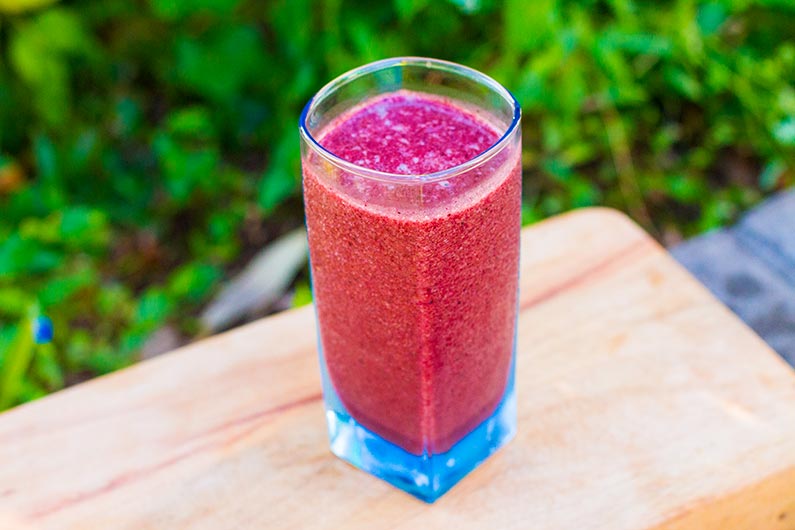If you say fasting, many people imagine an overpowering feeling of hunger and self-denial, while some imagine even danger. However, you should view fasting as a healing process that helps your body get rid of most of the toxic load you accumulate on a daily basis. And believe me, the amount of the toxins is pretty high not only because of your diet but also the environment, which is not as clean as it used to be.
First, let´s have a look at the difference between water fast and juice fast from the physiological point of view.
If you drink vegetable and fruit juices, we can hardly speak about fasting since your body still receives macro and micro-nutrients and minimal fibre from the juices and therefore the digestive system is still stimulated (despite this fact, such a situation is generally described as fasting so I´ll stick to the term even though it´s inaccurate).
If you fast drinking only distilled water that has been deprived of all vitamins and minerals, your gastrointestinal tract really “switches off“ and relaxes. Water fast is thus much more effective because the organism can make use of all the energy to regenerate.
Is water fast better than juice fast with respect to health issues?
Both types of fasting are effective. But what we know for sure is that in comparison with juice fasting, water fasting represents a quicker way for the organism to recover. On the other hand, it is more demanding with regard to energy and mental condition. Yet, both types are effective if you choose a suitable amount of suitable juices or if you follow specific recommendations when water fasting. Either type has both benefits and drawbacks. For example, my family and I have excellent experience with distilled water fasts that, among others, helped us eliminate skin problems and asthma.
Long-term water fast in people who are facing a serious illness (lasting for two weeks and longer) should take place under the control of a supervising health professional and in calm conditions. It is necessary to monitor the colour of your urine and in case your urine has turned too dark drink a sufficient amount of water in order to support the function of kidneys. Kidneys “filter“ toxins that leave your body more intensively thanks to fasting. On the contrary, you can juice fast in common conditions of everyday life because it is not so energy-intensive. You only have to be careful to choose suitable (preferably vegetable) juices and drink an appropriate amount of them.
Water fasting should not be considered the main tool to lose weight. As for weight reduction, juice fasting is a better choice but not a long-term solution. You have to change your eating habits and lifestyle, which may be difficult and challenging.
How much juice should you drink a day?
The golden rule is drinking between 1-3 litres a day in 3-5 rations, similarly to breakfast, lunch, dinner and potentially two snacks. You can dilute the juices with water at a ratio 1:1. Drink slowly, enjoy drinking the juice in the same way as you enjoy eating solid food. You can also drink pure water or herbal teas. Don´t force yourself to drink and only drink as much juice as your body bears in a given moment.
With regard to water fasting, you should drink at least 2-3 litres a day. Water intake is very individual and it also depends on the colour of urine. If you suffer from strong detox symptoms (and this applies to both water fast and juice fast), drink more water.
How long should you fast?
Fasting can last from one day to several weeks. Everything depends on what you desire to achieve. If you have been seriously ill for a long time, it is necessary to fast as long as several weeks but your body needs preparing, which can be achieved by means of shorter fasts that are gradually prolonged before you go into long fasting.
If you want to expose your body to regular cleansing and you do not suffer from any serious illness, then it is best to fast 1-3 days once a month or 1 day once a week or 7 days once half a year. Everything depends on the circumstances and how well your body gets used to fasting. I recommend fasting 1 day a week, which is 4 days a month, and the next month try fasting 2 days twice a month. You can gradually increase the number of fasting days until you reach 7 and more days. Nothing happens if you set a target to fast for 5 days and then interrupt it after three days. This is not a competition. Fasting is about getting connected to your body and your needs, and having the right motivation.
What can you expect during fasting?
As it was mentioned, water fasting is more challenging that juice fasting. Since it´s more intensive, detox processes are more intensive as well. Water fasting can be accompanied with headache, cold, nausea, pain in joints, backache, muscle pain, skin rashes, drowsiness etc. The symptoms are very individual but the unpleasant displays are absolutely normal – it is a healing process. When water fasting, your stool stops completely after 3-5 days.
How should you come back to solid foods?
One of the most important things you must not forget about is coming back to eating solid foods and the foods you´ll be eating when coming back to the normal state. The ideal solution is raw foods. There is a rule: your coming back to solid foods should ideally last as long as you have fasted. Sometimes it´s difficult to follow this rule. Based on my own experience, it takes about 3-5 days for the body to start functioning normally after long-term fasting. Organic raw fruits and vegetables (also steamed ones) represent ideal foods for the next several days after you have finished fasting.
Are there any contradictions?
Yes, there are! Fasting should be forbidden to pregnant women, nursing mothers, and small children because the toxins that flush out of your body much more intensively can be harmful to the foetus or they can get into breast milk. If you happen to be seriously ill, you can undergo fasting under the control of a health professional. In Europe there are special fasting retreat centres where you can be looked after if you don´t have the courage to start long-term fasting yourself.
Try out the effects of fasting on yourself. It´s the best present you can give to your body.


